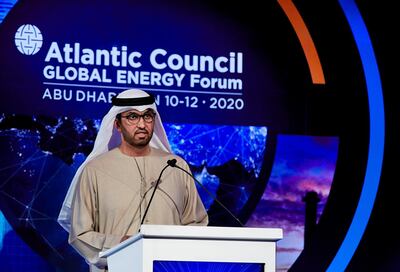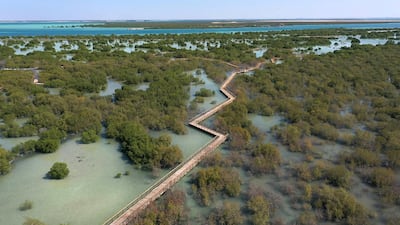As I settled down to begin work on this column on Sunday afternoon, there was a crack of thunder, a flash of lightning and the heavens opened. “Oh, not again!” I thought.
I was amused, though, to read excited comments how all of the rain is something utterly unusual. No, it is not. I recall several such heavy downpours and persistent rainfall over the years. Back in 1982, rainwater pools that collected on the sabkhas near Abu Dhabi airport after a similar period of high rainfall were still present months later.
Such weather events might not be common – perhaps every decade or two – but they are not unprecedented. If the rains are connected somehow to climate change, as our Minister of Climate Change and the Environment, Dr Thani Al Zeyoudi, has suggested, that should focus minds here on that globally-important issue, just as the fires in Australia have focused minds there.
It is appropriate in a way, however, that the storms and floods of the past few days have come just as the Abu Dhabi Sustainability Week takes place. The UAE's stated commitment to a sustainable future, against the backdrop of climate change, is widely reported. This week we can expect to hear more details of what exactly is being planned.
It was a pleasure, therefore, to hear Dr Sultan Al Jaber, UAE Minister of State and Adnoc group chief executive, at the opening ceremony of Sustainability Week on Monday morning, outlining a whole suite of ways in which Adnoc plans to deliver comprehensive sustainability goals by 2030, as it seeks to extend what he described as its "legacy of responsible production". Between them, they provide a good indication of the way in which issues related to a sustainable relationship with the environment are interconnected.
The Adnoc Group, for example, currently derives more than 99 per cent of the water it uses for cooling from seawater, which is then discharged back into the sea after treatment. It is now committed to ensuring that less than 0.5 per cent of the water used is fresh water, helping to reduce pressure on our depleting natural resources. That is a helpful contribution.
As a major oil and gas producer, Adnoc is responsible for greenhouse gas emissions, including carbon dioxide that directly contributes to global warming and thus to climate change. Adnoc is already in the top five lowest greenhouse gas emitters in the global oil and gas industry, with one of the lowest methane intensities, at 0.01 per cent. It is now committed to reduce overall greenhouse gas emission intensity by 25 per cent.
By reaching that target, its Al Reyadah plant will be capturing five million tonnes of carbon dioxide a year from its facilities, equivalent to the carbon capture capacity of over two million hectares of forests, more than twice the size of the UAE.

It is well-known that the depletion of the world's forest cover is a contributory factor to global warming. On top of its own carbon capture commitment from its facilities, Adnoc is also committing itself to plant a total of 10 million mangrove trees in Al Dhafra region by the end of 2022.
Expanding the areas of mangrove forests along our shorelines has other benefits too. They provide nursery areas for fish, including commercially-valuable species whose stocks have plummeted because of overfishing and other factors. They help to protect coastlines against erosion and against rising sea levels, which are another result of climate change. They provide food and shelter for birds and a variety of other species, many of them endangered.
If, as I hope will be the case, Adnoc commissions a long-term scientific assessment of the biodiversity of these new forests, I am confident that hugely-beneficial results from the programme will be identified.
There are other aspects of the new Adnoc announcement on which I am not qualified to comment. I will, however, single out one sentence in Dr Al Jaber’s speech.
“This commitment,” he said, “flows from the vision of the Founding Father of the United Arab Emirates, His Highness Sheikh Zayed bin Sultan Al Nahyan, who pioneered sustainability and the protection of the country’s natural ecosystems.”
I have been here long enough to remember the underlying reason for Sheikh Zayed’s instructions, more than 40 years ago, to the Adnoc Group companies that they should seek to harness and to use the natural gas that was then being flared as a by-product from oil production.
Today, natural gas is making a major contribution to the economy. Sheikh Zayed did not take his decision because of the economic benefits, though. He made it because he was worried about the adverse impact of flaring on the environment. He ordered the planting of many millions of trees. He had listened to the early warnings of the dangers of climate change.
As in so many other areas, he was an environmentalist long before it became fashionable.
His vision remains relevant today, not only with regards to Adnoc's important commitments but also, perhaps, to the storms and rains that lashed the Emirates last week. We continue to learn and benefit from that remarkable man.
Peter Hellyer is a consultant specialising in the UAE's history and culture


